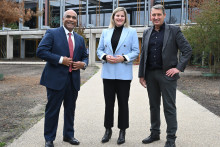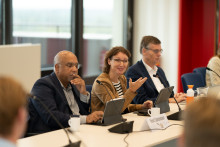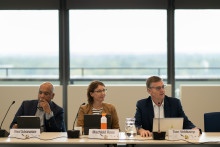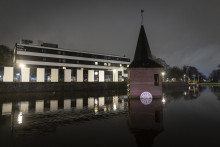While each faculty looks to the Ministry of Education, Culture and Science for the distribution of money, ITC's funding comes in a roundabout way. The basic funding will be available from so-called 'Official Development Assistance' (ODA) funds. This goes via the Ministry of Foreign Trade and Development Aid to the Ministry of Education, Culture and Science and then to the faculty.
'Worrisome development'
It is precisely that ODA funding that is being cut. From 2026 to 2028, ITC will have 14.5 percent less available. From 2029 onwards, there will be slightly fewer cuts compared to the current budget: 11.9 percent. All in all, it is a blow of roughly 3 million euros to the annual basic funding of 25 million euros. 'It's a worrying development', says Dean Freek van der Meer. 'We can’t simply brush this away in our budget.'
In any case, there will be substantial cuts in development cooperation. The Schoof cabinet is cutting 2.4 billion euros – more than two-thirds of the previously available 3.5 billion euros. 'A lot of programmes, such as the Orange Knowledge Programme, are in danger of disappearing and there seems to be nothing in return,' says Van der Meer. 'This will also have a negative effect on our activities, albeit to a much lesser extent than ODA funding.'
'Determine the starting point'
Since the financial blows are coming, is it a matter of anticipating an organizational change or reorganisation? 'I've never used the word reorganisation before', says the ITC dean. 'We first need to talk to the Executive Board about the challenges we are facing. Based on this, we determine the starting point together. A reorganisation is just one of the possible HR tools you can apply. Of course the situation is tense, but I'm not going to get ahead of myself. The most important thing is that we continue to keep perspective in the coming years.'
Future-proofing education
Making the faculty more future-proof, that's the motto. In the field of education, ITC is taking the necessary steps in this regard, according to the dean. For example, there is a plan to also offer the Master's in Geo-information Science and Earth Observation as an initial education – i.e. as education that people follow before they enter the labour market. 'In this way, we can make this programme more interesting for Dutch and European students,' says Van der Meer. ‘So they don't have to pay the high institutional fee, as is currently the case.'
ITC also wishes to have its own bachelor's programme. 'Either in collaboration with VU Amsterdam or by setting it up ourselves, that's what we're exploring,' says Van der Meer. The provision of lifelong learning, including through the company's own platform Geoversity, is also a priority. 'You could consider lifelong learning a hobbyhorse of mine – and fortunately it was one of the bright spots in the coalition agreement. We cannot continue to rely on education as we have been offering it for years. Our education needs to be used more flexibly, at times, places and in the way people want it.'
Paralyses country
It is not only a matter of wanting to, but also having to because of the new political wind that is blowing in the Netherlands. 'It's as if we're suddenly retreating behind the dikes, on our 41,850 square kilometres,' says Van der Meer. 'Something like that paralyses you as a country and our international competitive position crumbles. Educational institutions will also feel this. It surprises me that something that has been built up for years is broken down so quickly.'
It is therefore at odds with the international mission of his faculty, says Van der Meer. 'If you look at the entire migration debate in The Hague: migration doesn't start at the border. Good education is the basis for stability and economic growth in a region. In all modesty, that's exactly what we contribute to.'
Yet he reflects critically when it comes to proclaiming that added value. 'In a way, we're in a bubble. As a faculty, but also as a university. We have not shown our added value enough, and now we have to deal with the political situation as it is. If we want to get back on our feet, we need to work much more closely with society as a fourth-generation university.'






